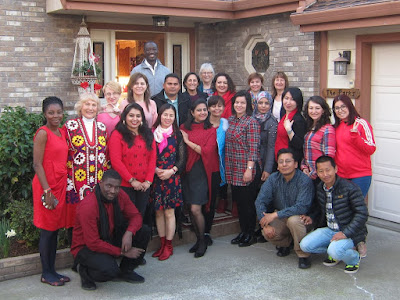Brick of the Wall to Pillar of the System: A Proud Delhi Govt School Teacher, Manu Gulati
The 2017 National Award for Teachers winner Manu Gulati is a school teacher at one of the Delhi government schools. Manu is a part of the government school system for the past 12 years but never witnessed massive reforms in the education system previously. With dual masters in English Literature and Education, Manu teaches verbal English at her school. She is also pursuing a PhD from Jamia Millia Islamia University in the area of enhancing listening and speaking skills of English among students in Delhi government schools. Manu was one of the six Delhi government school teachers selected for 2017-18 Fulbright scholarship program. At present, Manu has also taken the responsibility of a mentor teacher with Delhi government to improve public education in Delhi.
 |
| Manu Gulati receiving 2017 National Award to Teachers |
From being a single brick in the wall to becoming a strong pillar of the system, Manu received a lot of recognition in the past couple of years. She is very thankful to the Delhi government. She likes to introduce herself as a proud and happy Delhi government school teacher.International Relations: Recently Delhi government hosted the Asia Summit on Education & Skills organized by India Didactics Association. There were participants from different parts of India and 20 other countries. Ongoing education practices and challenges were discussed and display stalls were setup. During the conference, education ministeries of Afghanistan and India came closer and signed an agreement for education transfer. Afghanistan expressed its interest in implementing the happiness curriculum which they later did. Many participants from other nations were also keen about applying happiness curriculum in their home countries. Manu quoted Afghanistan education minister’s statement on happiness curriculum:
Afghanistan’s education minister strongly believes that happiness curriculum can actually ease out the stress among students in Afghanistan schools, the stress students face due to political turbulence in Afghanistan.Happiness curriculum, which was launched in the month of July, has already started making an impact on the students as teacher can notice their behavioral changes. Exams are the most stressful time for students but in comparison to previous years students were found less stressed during a social science exam. For those students, who were a part of the happiness curriculum, learning process became easy with increased focus.
 |
| Manu Gulati with Afghanistan Education minister during Asia Summit on Education & Skills |
Community Engagement: Community engagement in school system has increased with the help of School Management Committee (SMC) which consists of the school principal, teachers and student guardians who are elected via elections. Parents bring useful suggestions to SMCs and are the backbone of mega parent-teacher meeting (Mega PTM). SMCs are empowered by giving them the authority to make administrative decisions. Recently Delhi government has started allocating a minimum Rs 5 lakh to each school which can be used for any purpose decided by the SMCs. With this fund, teacher or special trainers can be arranged, furniture can be bought, additional lab can be built etc. The allocated amount increases in accordance with school enrollment.
Fulbright Scholar: Manu Gulati was one of the six participants who were selected for 2018 Fulbright scholarship. She was in the US from January to March 2018. This scholarship provided tremendous opportunity for Manu and others as they learnt a lot from the American education system. Some of the key focus areas of the program were academic excellence, subject oriented workshops, pedagogic intervention, visits to schools and school participation. All teachers came back to India with vast knowledge and started implementing useful learnings in their schools. In a one of its kind of change in the Indian education system, Manu with other teachers started moving students from one classroom to another for different subject periods in her elementary school. This movement created a win-win situation for both students and teachers. Classrooms became resourceful for teachers and students got an opportunity to move and interact with other students at the end of each class. Teachers who returned from the US also implemented subject specific learnings. All six Fulbright scholars are now sharing their experiences with 200 Delhi government mentor teachers who further transfer it to more than 50,000 public school teachers.
 |
| Manu Gulati with fellow Fulbright Scholars |
Sharing and Learning: Many innovative teaching methods are being introduced in Delhi government schools which is a continuous process. Academic Resource Team consists of teachers and researchers who collectively explore best practices used in different countries and then develop a program for Delhi government school students accordingly. Present Delhi government believes in inclusive learning and does not want the educational revolution to just stay in Delhi. A team consisting of software developers, teachers and government officials has started working on building a tool to share their knowledge with schools in other states of India. Soon, Delhi government will launch an online video series in which Delhi government school teachers will be recording lessons to be shared with teachers throughout India.
Watch full video of AAP Ka Radio conference call with Manu Gulati






No comments